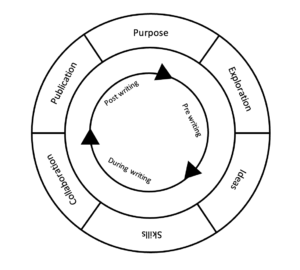
Elevating Student Voice in English
As humans we are born with the extraordinary capacity to communicate. From the moment we take our first breath, we are innately primed to connect with others to survive. Over time, through socialisation and intricate biological processes, we learn how to speak in words. But the process of learning to read and write needs to be taught in a more formalised and structured way.

Being able to create meaning through words is not a natural process. We are not biologically primed to read or write; it needs to be expressly taught. Writing, like other human endeavours, is a craft that needs to be nurtured, developed, and refined through mentoring, consistent, deliberative practice, and meaningful learning opportunities.
As C.S Lewis once stated: ‘You can make anything by writing.’ That is to say that through the written word we have the capacity to create, innovate, and empower. So, while its potential is unquestionable and its importance non-debatable, the way to develop the written literacy skills of each generation remains in the hands of educators. Of course, we are all educators, but in the formal education system it is the English teachers who are charged with the responsibility to develop the writing skills of our students.
At its core, writing should be about the writer communicating their thoughts, feelings, and attitudes to the reader; their voice must be present in their writing to be heard. However, in recent years, we found that student voices were not always present in their writing, their writing was becoming too formulaic, as their focus was on the final essay rather than the joy of crafting a response.
This year, as a team of English teachers, we engaged a writing coach and mentor, Leon Furze, to guide us through the process of redesigning our curriculum from Years 5 to 12. Acknowledging that ‘Learning the craft of writing… enables writers to find their own “voice”’, and it is a slow and considered process (Carey et al, 2022, p36), we redirected our focus. Our journey started through the collaborative process of crafting our English Faculty Vision, establishing learning goals, and then re-developing our writing units that focused on the craft of writing.

‘The Writing Cycle’ by Leon Furze and Benjamin White
A key strategy we used was ‘The Writing Cycle’ model which is outlined in ‘Practical Writing Strategies’ by Leon Furze and Benjamin White.
We dedicated more class time to the generation of ideas. Using carefully selected ‘mentor texts’, we examined extracts from both written and audio-visual texts, to inspire ideas and to provide samples of writing to our students. We engaged more in the conferencing process, providing opportunities for students to receive feedback during the writing process. Editing and proofreading, during the writing stage, became more prominent. From the outset, students were reminded about the importance of aligning purpose, form and audience when writing.
Of course, the product of writing is still a part of the process that is worthy of recognition. But to elevate its status beyond writing for an examination or in-class assessment, we re-vamped our internal writing competition renaming it ‘The Fintona Ringing Voices Writing competition’. Adding in more categories and allowing for more forms of writing was a key change made to this competition.

While expository writing is still part of our curriculum, the craft of writing has now become more prominent. We are in the early stages of our journey and student voice is now our focus.
On that note, I will remind you of the words of esteemed writer Ernest Hemingway: ‘There is no rule on how to write. Sometimes it comes easily and perfectly: sometimes it’s like drilling rock and then blasting it out with charges.’
Michelle Maglitto
English Learning Leader




